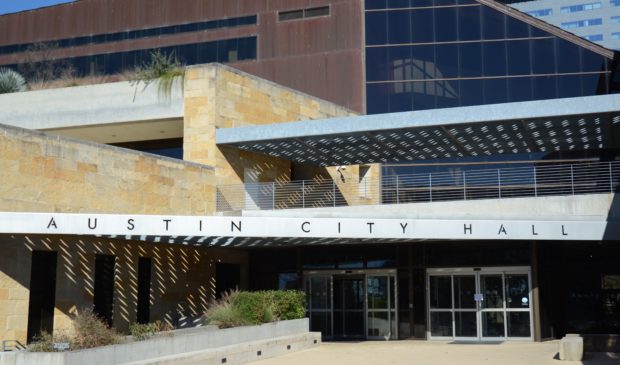Camping ban, strong-mayor proposal set for May 1 ballot
Wednesday, February 10, 2021 by
Jo Clifton Austin voters who go to the polls on May 1 will have no candidates to vote for. Instead, they will have numerous questions to answer about how Austin’s government should be run and whether to reinstate the ban on camping, sitting or lying on a public sidewalk or soliciting money between 7 a.m. and 7 p.m.
Voters will also have to consider whether Austin firefighters should be able to require the city to participate in binding arbitration. Finally, voters will need to decide whether to adopt an ordinance that would allow City Council to appoint a director of police oversight, rather than having the city manager do that.
In response to a petition filed by Austinites for Progressive Reform, Council decided on ballot language that includes changing the form of Austin’s city government from Council-manager to what is known as a strong-mayor system. The latter would eliminate the city manager and give the mayor veto power over legislation.
Mayor Steve Adler and Council Member Ann Kitchen had a lengthy and rather heated debate about the language concerning veto power and whether to add a phrase about how the veto could be overridden. Adler wanted to add the language, but lost the argument.
In the end, Council approved ballot language that reads: “Shall the City Charter be amended to change the form of city government from ‘council-manager’ to ‘strong mayor-council,’ which will eliminate the position of professional city manager and designate an elected mayor as the chief administrative and executive officer of the city with veto power over all legislation which includes the budget; and with sole authority to hire and fire most department heads and direct staff; and with no articulated or stated charter authority to require the mayor to implement Council decisions.”
Anticipating the need for an additional Council member, APR requested a vote on adding another geographic Council district, which would result in 11 single-member districts. Council decided to add that item to the ballot as a stand-alone issue. So it’s possible Austinites could reject the strong-mayor form of government but vote in favor of an additional district, which would mean the city would have an even-numbered, 12-member Council. That could lead to some interesting problems down the line.

Citizens opposed to the strong-mayor measure gathered in front of City Hall.
Council also approved language asking voters to decide whether the mayor should be elected in presidential election years, and providing for the mayor elected in 2022 to serve only a two-year term. In addition, voters will get to decide if they would like to have ranked-choice voting “if such voting is permitted by state law,” which is not currently the case. Voters will also be able to weigh in on a new campaign finance system, replacing the current system.
In addition to the charter amendments and ordinances brought to Council by citizen-initiated petitions, Council approved a proposal from Council Member Greg Casar asking voters to approve a charter amendment that would allow Council to appoint a director of police oversight. Currently, that person is appointed by City Manager Spencer Cronk. The vote to place the item on the May ballot was 10-1, with Council Member Mackenzie Kelly opposed.
Before beginning discussions and voting on the ballot language, Council heard from about 30 people who signed up to speak about the different propositions. Several came to express support for the camping ban, while others opposed it.
Matt Mackowiak, one of the leaders of Save Austin Now, warned Council that his group did not like the ballot language proposed by City Attorney Anne Morgan. He later told the Austin Monitor, “They immediately described our ordinance ballot language in such a way that makes it feel like we’re trying to criminalize homeless people, which we’re not. And it immediately points to citations, which I think prejudices voters against the entirety of what we’re proposing.”
Mackowiak said the city’s language constituted “editorial comment and … seeks to disenfranchise the rights of the 26,000 people who signed the petition.” He said his group would file suit against the city if they were dissatisfied with the ultimate language.
The language approved by Council reads: “Shall an ordinance be adopted that would create a criminal offense and a penalty for anyone sitting or lying down on a public sidewalk or sleeping outdoors in and near the downtown area and the area around the University of Texas campus; create a criminal offense and penalty for solicitation, defined as requesting money or another thing of value, at specific hours and locations or for solicitation in a public area that is deemed aggressive in manner; create a criminal offense and penalty for anyone camping in any public area not designated by the Parks and Recreation Department?”
There were also speakers both for and against the strong-mayor form of government and a group of labor union members who demonstrated outside of City Hall to voice their opposition to the APR proposal. Clearly, the items that will draw the most attention in the next two months are the camping ban and the proposal to eliminate the city manager and replace him with a strong mayor.
The Austin Monitor’s work is made possible by donations from the community. Though our reporting covers donors from time to time, we are careful to keep business and editorial efforts separate while maintaining transparency. A complete list of donors is available here, and our code of ethics is explained here.
You're a community leader
And we’re honored you look to us for serious, in-depth news. You know a strong community needs local and dedicated watchdog reporting. We’re here for you and that won’t change. Now will you take the powerful next step and support our nonprofit news organization?









